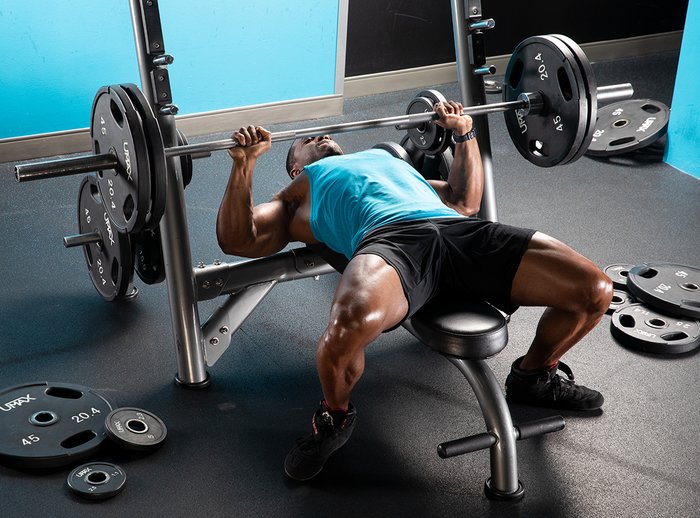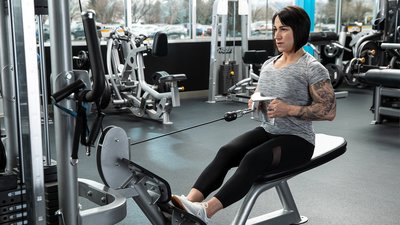When it comes to gaining muscle, there are many contributing factors. Let's look at what you're doing that could potentially be holding you back in the gym.
1. You're Not Overtraining, You're Under-recovering
Consider what weight training does to your body. By lifting weights, you are tearing down your muscles, so you don't gain muscle simply by lifting weights. You see gains only when you help your muscles recover from the work you do in the gym.
Recovery can come in many forms. In my opinion, there are three main areas of recovery that everyone should be aiding—not only to gain muscle, but also if you want to improve your general health.
Nutrition
What you fuel your body with before and after your workouts will dictate how well you perform in the gym and whether or not you gain weight. If you eat like crap, you'll feel like crap. If you eat foods that provide your body with adequate amounts of nutrients, your muscles will recover from the weights and grow back fuller and stronger.
Mobility
Mobility isn't just for people who do yoga. Everyone can benefit from having better mobility. If you lift weights and don't pay any attention to improving and maintaining your joint range of motion, you're setting yourself up for injury. Adding mobility work to your routine consistently will help your body recover from training and lead to improvements in overall strength, health, and muscle gain.

Sleep
You cannot cheat your sleep. Period. Everyone has different schedules, but you should try to get at least seven hours of quality sleep every night. If you go to the gym feeling tired and sleep deprived, you won't perform as well as you would if you'd had a full night's sleep. Occasionally, you can get away with eating unhealthfully and still have a decent workout, but when you train on a bad night's sleep, there's no amount of caffeine that will help you. Lack of sleep will increase cortisol levels, which leads to more body fat and fewer muscle gains. So, get to bed!
2. You're Focused on Testing Rather than Building
Leave your ego at the gym door because it is holding you back from packing on muscle. A lot of people feel that they have to lift as much weight as they can. They want to test how strong they are today, rather than working on building their strength. They put more weight on the bar than they can handle and end up missing a lot of reps and failing their set. If you treat every workout like a competition, you are headed down a dead-end street. If you treat your workouts like building blocks that work together to achieve a greater goal, you will add muscle and get stronger.
To do that, you need to consider volume in your training plan. Volume is the total amount of weight you lift over the course of a workout. It's a key factor in your progress and an excellent illustration of why pushing max weights doesn't always bring max gains.
Let's say you get to the gym and it's bench day. You put 135 pounds on the bar and start your workout. On the first set, you complete 10 reps. On the second set, you get 7, and on the third set, you manage 4 reps until someone has to pry the bar off your chest. You have successfully completed 21 reps, which is a total volume of 2,835 pounds (135 x 21 = 2,835).
To begin with, you didn't warm up before getting to your working weight, and as a result, you weren't prepared to do 3 sets of 10 with 135 pounds. Beyond that, however, you'd have been better off with less weight on the bar. Let's say you do at least a few warm-up sets and drop the working weight down to 125 pounds. You perform the first set and get 10 reps. You get 10 reps again on your second and third sets, successfully completing 30 reps with 125 pounds, a total volume of 3,750 pounds, not including the warm-up sets. So, by putting less on the bar, you lifted 915 pounds more weight (3,750 – 2,935 = 915), a huge difference in volume.

3. You're Emphasizing Isolation and Machine Exercises Over Compound Lifts
There is definitely a time and place for isolation exercises. Everyone loves doing push-downs, bar curls, and lat pull-downs, and I'm no different. It's also true that a large portion of the gym population focuses heavily on isolation movements while neglecting the compound lifts. If your goal is to add muscle, think of your workout as a three-course meal. Your appetizer is the warm-up, your main course is the compound lifts, and dessert is the isolation exercises.
Compound lifts are multijoint exercises that incorporate more than one muscle group at a time. They include squats, presses, deadlifts, and pull-ups, just to name a few. Compound exercises not only add muscle but will make you stronger, and the stronger you are, the more muscle fibers you can engage. The more muscles you engage in a movement—whether it's a compound lift or an isolation move—the more weight you can handle, and the more weight you can handle, the more your muscles are going to grow.
You can't add muscle without a basic foundation of strength, and you don't get stronger by doing curls. You get stronger by putting your body in a position where it has to engage a maximal amount of muscle fibers in order to produce force to move an external load. If you focus purely on isolation movements, you are simply pumping blood. If you focus on lifting with big, compound movements, you engage more motor units, which leads to more strength, more muscle, and more gains.
4. You Don't Have Enough Variety in Your Routine
Exercise variety is a key factor in building muscle. Remember when you first started working out and felt really sore the next day? Your muscles weren't used to performing the new exercises and were adapting to them. Whether you are an experienced trainer or a beginner, your muscles respond to new movements.
If you put the best men's bodybuilder in the world in a ballet class, I guarantee you he'll be feeling muscles he's never felt before for at least the next few days. That's because his muscles have become used to performing a certain way and when taken out of their comfort zone, they are challenged to work differently.
Even so, the muscles get bored fast, so if you have been following the same routine with the same exercises, lifting the same weight, at the same intensity and can't remember the last time you've seen results, try adding some new exercises. That doesn't mean doing something completely random every other day, it means sprinkling new exercises throughout your program to challenge your muscles so they don't get bored.

Another way to add variety to your workout is to use the same exercises but change the order in which you perform them in your workout. If you always start leg day with squats, try doing hip thrusts or lunges first. If you always start chest day with bench presses, try doing an incline press first to create a new stimulus in the muscles.
Key Points for Adding Muscle
Here are your takeaways for how to shake up your workouts and stimulate gains:
- Allow your body to recover from the gym by getting sufficient nutrition, doing mobility work, and getting quality sleep.
- Treat your workouts like building blocks to a greater goal and work with weights that you can lift for the full sets and reps.
- Focus on performing compound lifts and use isolation exercises to help improve the main lifts.
- Make your muscles work in new ways and add variety to your exercises.
Bodybuilding.com All Access contains more than 50 expert-crafted workout plans that incorporate these sorts of training strategies and more! Join today and begin the plan that's right for you!



